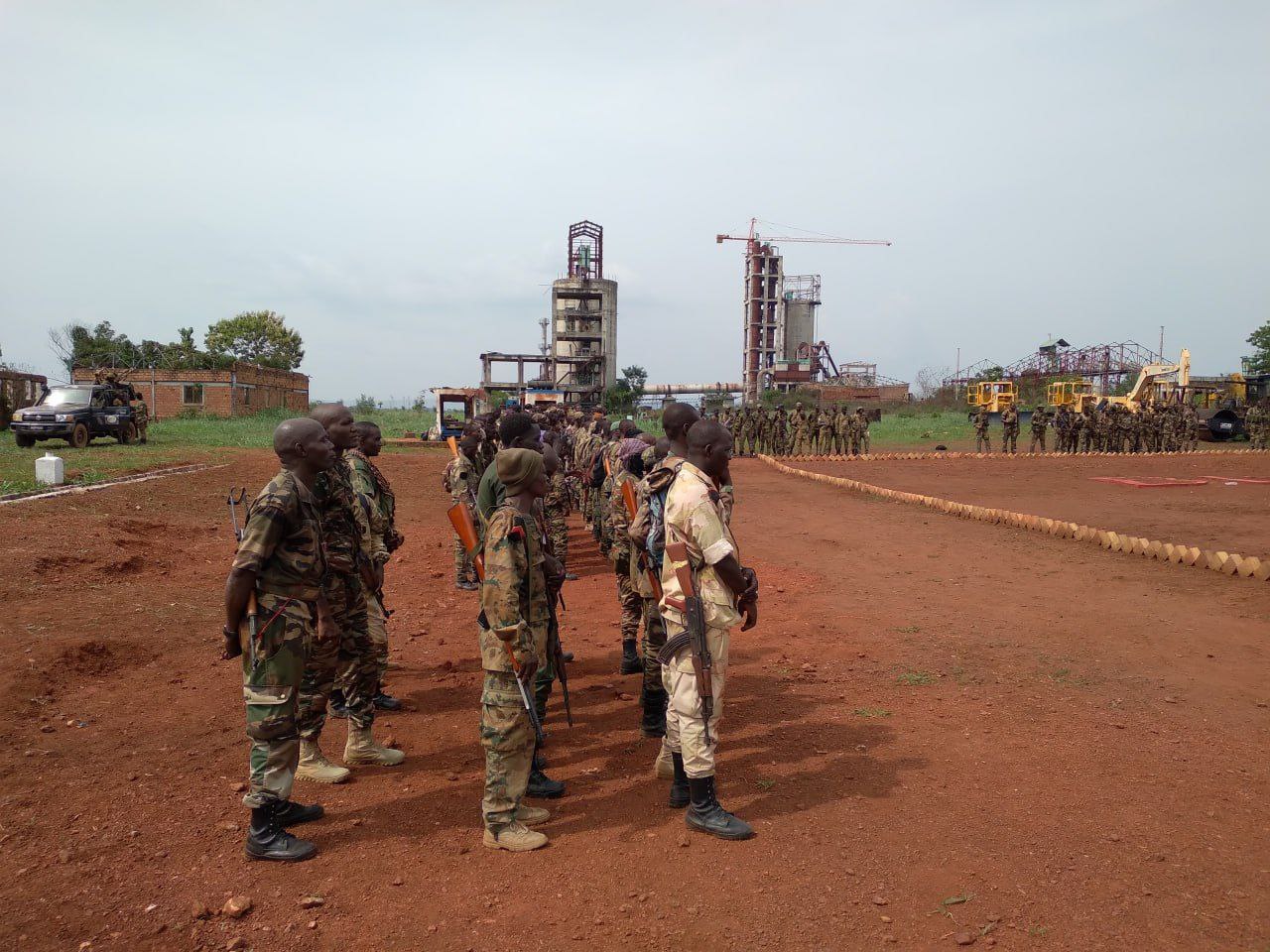Over 2,000 personnel from the Central African Armed Forces (FACA) undertook a four-day anti-terrorist tactical exercise between April 9th-12th, with guidance from Russian military specialists at Bangui’s Nzila cement plant.
What You Need to Know:
The exercise centered around a simulated terrorist attack, with the Rapid Intervention Battalions (BIR), the Support and Protection Battalion (BAP), the Central African Special Forces, elements of the Bangui Autonomous Defense Zone (ZDAB), and the Gendarmes, with advice from Russian specialists, trained on protecting essential assets in the nation’s capital, Bangui.
The terms ‘Russian instructors’ and ‘Russian specialists’ have long been used by Russian officials to refer to members of Russian paramilitary group Wagner, particularly when speaking on Russian activities in Africa.

Pictured: Various elements of the Central African Armed Forces stand to attention at Nzila Cement Plant, Bangui.
History:
The Central African Republic (CAR) has been militarily aligned with Russia since 2017, with Russian President Vladimir Putin making use of the United Nations Security Council (UNSC) decision to allow exemptions on a case-by-case basis to the arms embargo placed on the CAR since 2013.
The embargo was the result of a coup conducted by Michel Djotodia, the leader of the primarily muslim Seleka rebel coalition in March 2013. Djotodia was forced to resign in January 2014, after various primarily christian ‘anti-Balaka’ coalitions formed in response to his Seleka forces, plunging the country further into violence.
As a result, the UN established the Multidimensional Integrated Stabilization Mission in the Central African Republic (MINUSCA) in April 2014, which holds the protection of civilians as its main priority as well as “creating the political, security, and institutional conditions conducive to national reconciliation and durable peace.”
President Faustin-Archange Touadera came to power in 2016, with fighting between Seleka and Anti-Balaka forces only slowing in the Capital.
Since then, various rebel groups have held control over territories across the CAR landscape, with Bangui being the only government stronghold.
The Details:
Through the embargo exemptions, both France and Russia have supplied the CAR with weapons in an attempt to aid the nation’s security services in its ongoing battle against insurgent groups.
Additionally, since 2018, the CAR has also relied on Russian paramilitary group Wagner to bolster its forces in return for resource concessions made to Kremlin-linked businesses, which allows Russia to circumvent international sanctions and fund its war in Ukraine.
In the months prior to the CAR’s December 2020 election, former Seleka and anti-Balaka members formed the Patriots for Change (CPC) coalition in resistance to Touadera’s possible re-election.
Touadera was re-elected, prompting the CPC to attack Bangui in January, with Wagner and MINUSCA forces, primarily made up of Rwandan, Bangladeshi, and Pakistani soldiers, repelling the attack.
So, What Now?:
Wagner members and military personnel deployed to the CAR as part of Russia’s ‘regime protection program’ have been accused of committing grave human rights abuses against the civilian population.
In Febuary, the US Department of State released a report on Wagner’s activities in Africa, claiming the group has reportedly murdered civilians and razed entire villages in the CAR to advance their economic interests in the mining sector.
In late 2023, MINUSCA’s mandate was extended until November 15th 2024, with the mission unlikely to fulfil its goals as the CAR and much of West Africa continues to pivot toward the Russian sphere of influence.
This pivot can be seen particularly in Niger, with the country cutting military ties with the United States in mid March.
On April 12th, as the military exercise in the CAR drew to a close, around 100 personnel from Russia’s ‘Africa Corps’ deployed to the Nigerien capital of Niamey to train Niger’s Armed Forces. The deployment was authorised through a series of military cooperation agreements signed between Russia and Niger in December of 2023 and January this year.


